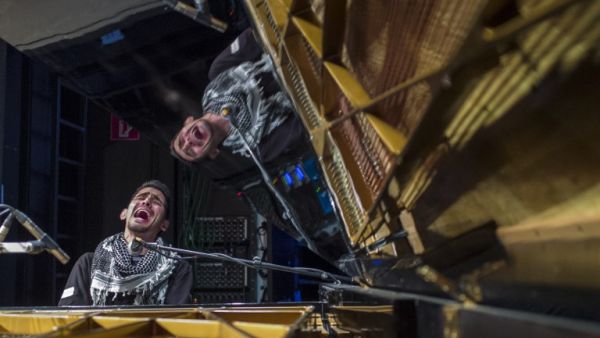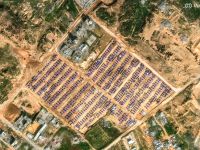The pianist of Yarmouk in his new land
It was the only thing Aeham Ahmad saw when he entered the room. A shiny Bechstein piano on which he would play in a few hours, on a Berlin stage aptly named “The Home Port.”
We met ahead of the performance for our interview and the first thing I noticed were his huge eyes. And his backpack. I recognized it right away. It’s with this backpack that he traversed thousands of kilometers eight months ago, making his way from Damascus to Berlin. In battered buses, boats, trains, on foot. Like hundreds of thousands of other Syrians, forced into exile by the war in their land and after months arriving -- exhausted -- in Germany.
Continue reading on AFP Correspondent
Art of Mohammad Khayata
Khayata’s work is beautiful – it’s sensitive, powerful, thoughtful. In Bits and Pieces, he portrays symbols of what went on in Syria, combining stories and memories like a patched work stitched and tied to a canvas.
The images capture real life grief – from the portrait of a man wrapped in a patched quilt made of memories to another one disappearing into a patched quilt holding a suitcase in preparation to leave behind his world and life as he knew it.
Continue reading on Middle East Revised
The war on 'sinful' music concerts in Iran
Since the 1979 Islamic Revolution, religious leaders and hardliners have imposed tight regulations and extensive bans on the country’s musicians, and demanded they conform to and promote strict Islamic values. Despite the election of a moderate president in 2013 and government measures to loosen up on some of these regulations – including granting a greater number of licences to bands to stage concerts – Iranian artists continue to work in a repressive, even hostile climate, and are repeatedly targeted by hardliners.
During the week of May 9 alone, local authorities canceled two concerts by famous Iranian musicians, who had been scheduled to perform in the city of Nishapur in Razavi Khorasan Province – concerts that had already received the necessary permissions from the Ministry of Culture and Islamic Guidance.
Continue reading on IranWire







